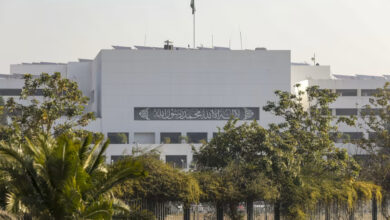A military coup? A triumph for people power? Egyptians watching as President Hosni Mubarak's 30-year rule disintegrated on Thursday could not be sure.
When a grim-faced military spokesman appeared on television to read "Communique No. 1" announcing that the army's higher council was in continuous session — in Mubarak's conspicuous absence — it looked like a classic military takeover.
Protesters in Cairo's Tahrir Square and elsewhere joyously celebrated reports of Mubarak's imminent departure, but for now decision-making appeared to have devolved to the military.
The Muslim Brotherhood, seen as Egypt's biggest organized opposition group, said it "looks like a military coup."
Hours later, uncertainty still remained over whether the army had taken over or Mubarak was still in power. Rumors flew that the 82-year-old leader would hand over to Omar Suleiman, his intelligence chief and newly appointed vice president.
"The fact that the army met without Mubarak who is the head of the armed forces means that the military has taken over power and I expect this to be announced shortly in Mubarak's televised speech," said Nabil Abdel Fattah, an analyst at Cairo's al-Ahram Center for Political and Strategic Studies.
"The army would then ask protesters to go home and in the coming period, it could decide to dissolve parliament and cancel the constitution, effectively making it the legislative authority," he said.
Abdel Fattah predicted a transitional government composed of military and civilian figures, with a cabinet headed by a younger prime minister "known for his competence and decency."
In Tunisia last month, former President Zine al-Abidine Ben Ali fled the country, apparently after army commanders refused to crush popular protests against his 23-year rule.
Rumors also swirled that Mubarak had left the country, despite his previous vows to "die on its soil."
"This is the height of confusion," said Hassan Abo Taleb, another analyst at the al-Ahram Center.
"It seems there are still negotiations going on between the army and the presidency. I think the army doesn't want to override the constitution, otherwise they would have clearly and openly announced that Mubarak was being pushed out."
He said chaos in Egypt was affecting the cohesion of the armed forces, whose leaders might consider three options.
The military could impose martial law, suspend the constitution and take power, warning protesters to leave Tahrir Square or face force. It could force Mubarak to transfer power to Suleiman. Or it could install a transitional government.
Any transition would be eased if Mubarak used his vast powers to institute constitutional changes before any handover of his prerogatives to Suleiman.
If the military takes over, there is no guarantee that it will ensure a transition to civilian rule, let alone democracy.
All of Egypt's four presidents since Gamal Abdel Nasser and the "Free Officers" toppled a British-backed monarchy in 1952 emerged from the military.
In recent Arab history, military coups have rarely been followed by a return to civilian rule — although a Sudanese general followed that route after ousting former President Jaafar Nimeiri in 1985.




